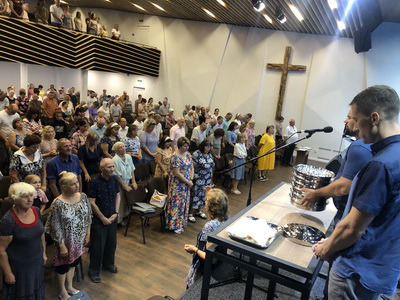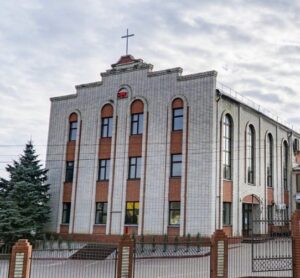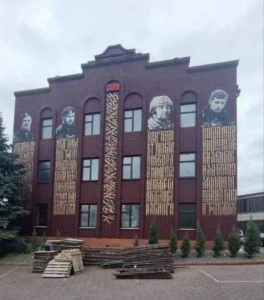On Sept. 11, 2022 – as America marked another anniversary of a heinous act of terror – nearly half a world away, the Sunday worship service at the Church of Grace in Melitopol, Ukraine was interrupted mid-hymn by fully armed Russian soldiers who ordered parishioners to stop singing and present their passports. The congregation’s leader, Reverend Mykhailo Brytsyn, would soon be advised by the soldiers that he and his family had two days to leave the city or face certain execution.
Brytsyn, a Baptist minister, was accused by Russian authorities of being an “extremist” and “an American spy.” In reality, Brytsyn was targeted because the Russian regime views his faith as a direct threat – his Christian beliefs represent a commitment to an authority who, in the Kremlin’s eyes, are a Western threat to its authority.
Reverend Brytsyn began his journey of faith in the 1980s, attending secret house churches when Ukraine was under Communist rule. After Ukraine declared its independence from the Soviet Union in 1991 and he graduated from seminary in 1992, Brytsyn was ordained at Melitopol’s Church of Grace. As part of the Evangelical Baptist Union of Ukraine, Brytsyn’s goal was to bring the church into contemporary times, while also making services accessible to everyone.

His work became more challenging after Russia’s illegal annexation of Crimea and invasion of eastern Ukraine in 2014, when Melitopol received a growing number of internally displaced persons (IDPs). Brytsyn recognized his church could provide humanitarian support and serve as a place of refuge for IDPs. In early 2022, Russia began its full-scale invasion of Ukraine and occupied parts of four Ukrainian territories, including Melitopol. Brytsyn continued to work as a humanitarian, even though the harsh realities of the occupation in Melitopol were setting in.
In occupied territories, Russian soldiers use fear to assert dominance over churches and their leadership forced deportations, kidnappings, unlawful imprisonment, torture, and re-education for those who choose to stay. Despite these fears, Brytsyn and other religious leaders continued their work – even organizing an Interdenominational Council of Churches in Melitopol, who often gathered in public squares to pray together.
When I asked Brytsyn what the Russian military said to try to justify their occupation, he told me, “[Russian troops] told us they would set us free. And they did set us free – free from having clean water, free from going to the pharmacy, and free from working electricity.”
Brytsyn also shared that the most recent conflict is not the first time that his church building has come under Russian occupation, having been seized in 1936 and again in 1949 by Soviet authorities.
During the 1936 occupation of the church, three church leaders were detained. Their charges? Extremism and espionage.
Again under the control of Russian authorities, the Church of Grace has been converted into a Russian “Ministry of Culture.” The once historical building has been desecrated – painted red and embellished with portraits of Russian soldiers killed in the war, and the cross atop the building removed.
|
|
|
Despite Moscow’s false propaganda that its relationship with the Russian Orthodox Church makes Russia a defender of religious freedom, non-Russian Orthodox faith communities in occupied Ukraine continue to face persecution. And unfortunately, Brytsyn’s story is not an isolated one.
To shed light on the targeted persecution of religious communities in Ukraine, the Ukraine Freedom Project is releasing a new documentary: A Faith Under Siege.
Featuring firsthand accounts from Brytsyn and other religious leaders, the film documents the deliberate and systematic persecution of Ukrainian evangelicals and describes the enduring power of faith during war.
These are not just Ukrainian struggles – they represent a universal fight for religious freedom and human dignity. As the George W. Bush Institute has emphasized in its recommendations for American policymakers, the United States and its allies play a crucial role in supporting Ukraine in what is now a global conflict between freedom and autocracy. By working with European partners to bolster Ukraine’s defense, strengthening sanctions against Russia, and supporting accountability for Russian crimes committed against Ukrainians, including church leaders like Brytsyn, the U.S. can send a clear message: Religious persecution has no place in the free world.
Today, Brytsyn and his family live in exile in western Ukraine, where he still preaches through virtual channels to his congregation – whose members are now scattered around the globe. He also serves as a humanitarian and advocate for a free Ukraine and collects evidence of Russia’s repression of religious freedom in the country. When asked what gives him hope for the future, Brytsyn told me, “I have seen that persecution doesn’t make people weak – we stay true to our beliefs, and this truth, it sets us free.”































